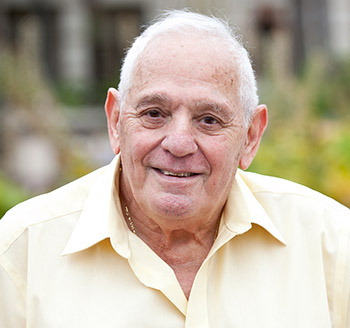
George Weiss
For more than two decades, George Weiss made his way to USC Shoah Foundation almost every week, to add yet another layer to the story he is helping preserve. Sentence by sentence, memory by memory, Weiss wants to ensure that history does not get lost.
Weiss transcribed numerous testimonies of Holocaust survivors. “Hundreds, thousands of testimonies — all different subjects,” he says. “They could be describing what they did after the war. Did they go back to school? Did they have a business?” He finds that each personal remembrance brings the speaker into focus — what they had and what they lost.
Born in Belgium in 1933, Weiss has a deeply personal connection to these stories. “I was one of the ‘hidden children.’ My wife, Gisele, lost both of her parents,” he says. “Listening is really, really not easy; some of the things the survivors went through were horrific.”
He keeps to his task, however, because he knows it is imperative. In the scope of his own lifetime, he has witnessed a different nightmare: Jewish children who do not know their own history, and deniers who insist that these past atrocities are fictions. It makes his weekly work an essential ritual.
“In another four or five years, there won’t be any Holocaust survivors who were in camps,” Weiss says. “The children will still be around — the hidden children, like we were — but the Holocaust survivors won’t be around. And sooner or later, like now they already say, ‘It didn’t happen; it’s a myth.’ But through the Institute we will make sure that if we talk about it and people, through technology, can see people, not just a voice, it won’t die off.”